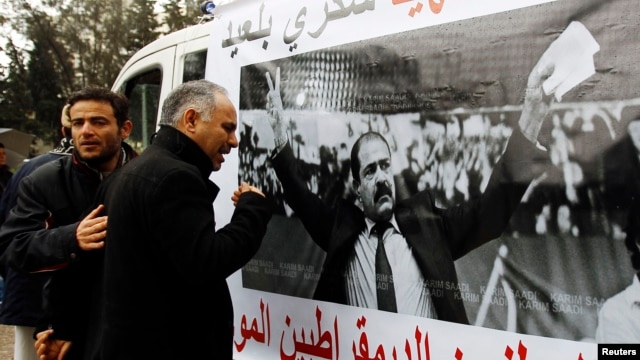The Divisive Religion
"We demand the departure of the interior minister. The interior minister holds personal responsibility for the assassination of Shokri Belaid, because he knew he was threatened and he did nothing."
Nejib Chebbi, leader, allied secular Republican Party, Tunisia
A man cries next to a poster with an image of Chokri Belaid, a prominent Tunisian opposition politician who was shot dead,Tunis
Shokri Belaid, a fierce critic of Islamist violence, was marked for death. The very Islamist violence that he decried so fiercely, delivered him to an early death. As head of the left-wing, anti Islamist Democratic Patriotic party, at 48 years of age, and representative of the best traits of Tunisians, he died for what he believed in. Shot three times, while leaving his home in Tunis, the capital.
Two years after Tunisia, the first of the Arab countries to experience an insurrection, one that was embarked upon in explosive anger at the self-immolating death of a fruit vendor, humiliated and exploited, taking death as an expression of resistance yet loss of hope for the future, Tunisia settled its political differences relatively peacefully with the ouster of its former president, Zine al-Abidine Ben Ali.
There was violence and there were deaths, but Tunisia was no Syria.
And a 'moderate' Islamist party came to governance, a coalition government that incorporated secular politicians, even while Salafists attempted to garner more influence for themselves and the government vacillated. At Mr. Belaid's death, a shaken prime minister stated on television: "I have decided to form a government of competent nationals without political affiliation, which will have a mandate limited to managing the affairs of the country until elections are held in the shortest possible time."
But he hadn't consulted his party, and the ruling party, Ennahda, whom its leader, Rachid Ghannouchi was accused of secretly sympathizing with the perpetrators of violence by Mr. Belaid, refused to comply with the prime minister's plans. The country is now in the grip of massive protests.
"I accuse Rached Ghannouchi of assassinating my brother", said Abdelmajid Belaid: "My brother was assassinated. I am desperate and depressed."
Mr. Belaid's wife Basma blames Ennahda for his assassination as well. "I saw his blood flowing, I saw his little smile. I saw that they want to kill democracy", she mourned. And now, the country deemed to have drawn itself successfully out of the Arab Spring into a new democratic institution, but which has suffered the fate of all other countries that have undergone the process in economic depression, is now undergoing new protests and future uncertainty.
The young man described as wearing a traditional Tunisian hooded robe, a burnous, seen fleeing after the death of Mr. Belaid has not been apprehended. Mr. Belaid's party, the Popular Front coalition has withdrawn from the constituent assembly, in the process of re-writing the country's constitution. They may call for a general strike, which will further destabilize the country, which, since its Arab spring has never had its equilibrium restored.
The suspicion, resentment and anger between the secularists and the Islamists reflects the situation in Egypt. It seems the Arab Spring, wherever it erupted, has not resulted in anything resembling the hopes and aspirations of its original protests, but ended instead in a hostile stand-off between social, religious and political polarities.
Labels: Conflict, Crime, Democracy, Human Relations, Islamism, Tunisia


<< Home